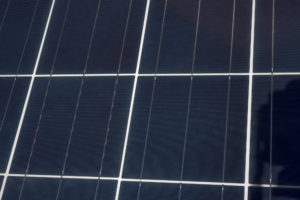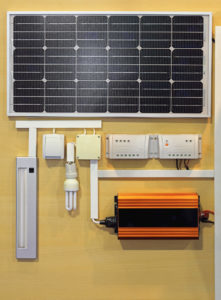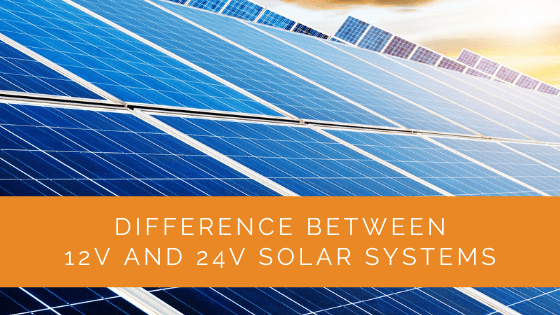With increased awareness about environment-friendly power sources, solar systems are slowly making their way into the mainstream market. Apart from no electricity bill hassles, solar power is also beneficial in eliminating toxic gas emissions and improving overall grid security.
Today, solar energy technologies have made insurmountable development and presented multiple installation options. You can easily pick between different volt solar panels for your house based on your preference.
Two common solar panel types you will encounter are 12V and 24V. But before moving ahead with the purchase, it is necessary to understand their basic functionalities, uses, and features.
This article will discuss the difference between a 12v solar panel and a 24V solar panel.
Contents
- 1 Key Takeaways
- 2 How is Solar Power Determined?
- 3 What is a 12V Solar Panel?
- 4 What is a 24V Solar Panel?
- 5 Differentiation Between 12V Solar System and 24V Solar System
- 6 Case Study: Transitioning from 12V to 24V Solar Systems for Enhanced Efficiency
- 7 Solar System Voltage Calculator
- 8 Expert Insights From Our Solar Panel Installers About the Difference Between 12V and 24V Solar Systems
- 9 Frequently Asked Questions
- 10 Experience Solar Excellence with Us!
- 11 Conclusion
Key Takeaways
- Solar panels come in two common voltages: 12V and 24V, each with its advantages and disadvantages.
- A 12V solar panel is suitable for portable and small-scale applications, while a 24V panel is better for larger energy needs in houses and commercial spaces.
- Choosing between 12V and 24V panels depends on your power requirements, battery compatibility, inverter compatibility, real use cases, and budget considerations.
How is Solar Power Determined?
Each solar panel available in the market is marked with specific watts and volts. These values signify the amount of energy produced by that particular panel individually. Watts specify the power value and help you understand the electricity load that a solar panel could cover.
On the other hand, the volts value tells you about the electrical pressure needed to keep the current running in the circuit. Power is calculated by multiplying the voltage rating and the resulting current output. However, a higher voltage system doesn’t need to imply a greater watts value too.
Therefore, it is advised to check your house’s total power consumption and energy needs before going ahead with the solar installation.
What is a 12V Solar Panel?
As the name suggests, a 12V solar panel connects to devices with the same voltage rating and produces a total of 12V. Here, you will usually find 36 solar panels that deliver 0.5V each. Even though the solar panel size can vary, usually it is available in rectangular form.
A 12V solar system is mainly used for portable use cases like motor homes, Caravans, fishing boats, etc. You can also use the same power system to light up your garden lights or cabin temporarily.
Boats or RVs are mostly fitted with all appliances complying with 12V guidelines. Therefore, setting up a 12V battery and a solar panel gets even more straightforward.

Advantages of 12V Solar Panel
- Pricing – 12V solar panels are cheap and will cost you less than paying electricity bills each month. Also, 12V inverters are way more affordable than 24V inverters.
- Less Heat Loss: A 12V system is compactly packed with all its elements, thus reducing the chances of heat loss.
- Readily Available: Most factory-produced electrical devices, inverters, fuses, or batteries are marked 12V. Therefore, you will easily find 12V systems.
- Minimal Maintenance: A 12V panel is less likely to give you any technical trouble, even with minimal maintenance. If repair is still needed, spare parts are readily available in the market.
- Emergency Charging: If you run out of battery, you can hook up the battery bank to your vehicle’s alternator and charge.
Disadvantages of 12V Solar Panel
- Wire Sizing: 12V requires bulky wires to secure the connection between the battery and the inverter. Large-sized diameter wires are more costly as they need more Copper.
- Voltage Loss: A 12V panel will lose more voltage and heat over a significant distance.
- Inverter Quality: Most inverters compatible with 12V panels are not meant for continuous, rigorous use.
What is a 24V Solar Panel?
If your energy consumption is around 1500-2000 volts, a 24V solar panel will better serve the purpose. Similar to a 12V panel in most ways, a 24V panel just utilizes double the number of energy cells to produce more power. Therefore, a 24V panel will include 72 individual solar cells producing 0.5V.
A 24V solar system is enough to power a mid-sizes house with limited electricity needs. Additionally, a 24V system can also be utilized in commercial spaces like hospitals, hotels, banks, etc.
Advantages of 24V Solar Panel
- High Voltage Production: 24V panels use 72 solar cells with 0.5V capacity. As a result, each panel can produce up to 32-36V.
- Lower Voltage Drop: As the voltage supplied is half the electrical current running in the circuit, there is a low voltage drop. Lower amperage also implies that the system requires a smaller diameter wire that is cheaper than thick ones.
- Compatibility: A 24V panel can work with both 12V and 24V appliances.
- Easy Installation: Installing 24V modules on a large scale is easy and inexpensive.
- Minimal Heat Loss: Unlike a 12V panel, a 24V panel shows heat retention properties and is not likely to fail if covering a long distance.
Disadvantages of 24V Solar Panel
- Expensive: Compared to a 12V panel, a 24V panel is way costly.
Differentiation Between 12V Solar System and 24V Solar System
You can check whether a 12V or 24V solar system will meet your energy needs based on your power requirements. Here are a few technical factors to help differentiate between both types.
Battery Compatibility
Your solar panel rating should vary with the battery rating. For example, a 12V panel should ideally be connected to a 12V battery. Similarly, a 24V panel must be connected to a 24V battery.
But 24V batteries are unavailable in the market. Therefore, you can quickly form a 24V battery by connecting two 12V battery devices in a series connection.
Inverter Compatibility
By default, solar panels produce Direct Current (DC). But most of our home appliances and the power grid system are compatible with Alternating Current (AC). To convert DC power into AC, you must install a solar inverter.
With a 12V solar panel, you need to install a 12V inverter. Similarly, with a 24V solar panel, an inverter with 24V solar input must be connected in series.

Charge Controller Compatibility
Solar charge controllers monitor the power transferred to the battery bank from the panel systems. Charge controllers help in ensuring that an increased output voltage does not overcharge the battery during the day, only to be drained back to panels during the night.
Additionally, you can also use a charge controller to monitor load control or lighting. You will find two types, a PWM charge controller and an MPPT charge controller. However, an MPPT controller is more efficient than a PWM one.
Before going forward with the solar installation, you should check if the 12V panel is paired with a 12V charge controller. Likewise, for 24V panel setups. Here, it is crucial to note that the rating of the charge controller does not exceed that of a solar panel.
Real Use Cases
12V solar panels are more versatile and can be used in portable conditions as well. Usually, you will find that these solar systems are used for various off-grid applications like school projects, tourist vans, or smaller houses.
On the other hand, 24V solar panels are meant for higher wattage requirement cases with electrical appliances that are used regularly. Such solar systems are primarily found in industrial buildings or large off-grid houses.
Pricing
You will find that 12V solar panels are available in lower watt values like 10W, 40W, 50W, 125W, 160W, 180W. However, 24V solar panels are available only in 330W and 350W.
The general price range for a 12V solar module is around $20-$200. Similarly, the price range of a 24V solar panel is about $150-$350.
Case Study: Transitioning from 12V to 24V Solar Systems for Enhanced Efficiency
Background
Solar Panels Network USA was approached by a homeowner who initially installed a 12V solar system for their modest energy needs. Over time, as their energy consumption grew, the limitations of the 12V system became apparent, prompting them to consider upgrading to a 24V system for better efficiency and capacity.
Project Overview
The goal was to transition the existing 12V solar system to a more robust 24V system. This involved evaluating the current setup, determining the energy requirements, and designing a new system that could meet the increased energy demands while maintaining efficiency and reliability.
Initial Assessment
We began by conducting a comprehensive assessment of the homeowner’s energy usage and the performance of the existing 12V solar system. This included measuring the voltage output, checking for voltage drops, and evaluating the condition of the solar panels, inverters, and batteries.
System Design and Planning
Based on the assessment, we designed a 24V solar system that could seamlessly integrate with the existing infrastructure. The new design included:
- Upgraded Solar Panels: Transitioning from 12V to 24V panels with higher wattage and efficiency.
- Inverter Compatibility: Installing a new 24V inverter to handle the increased voltage and convert DC to AC more effectively.
- Battery Configuration: Configuring the battery bank with 24V batteries to store the generated power efficiently.
Implementation
Installation
Our team carefully installed the new 24V solar panels, ensuring optimal placement for maximum sunlight exposure. The wiring was upgraded to handle the higher voltage, reducing potential heat loss and voltage drops.
Integration with Existing System
We integrated the new 24V system with the existing electrical setup, ensuring compatibility and smooth operation. The new inverter and battery configuration were connected to provide a seamless transition from the old system.
Testing and Optimization
After installation, we conducted thorough testing to ensure the system was operating at peak efficiency. This included checking voltage outputs, ensuring minimal voltage drop, and verifying the performance of the new components.
Results
Enhanced Efficiency
The new 24V solar system provided a significant boost in efficiency. The homeowner experienced a more stable and reliable power supply, even during peak usage periods.
Increased Capacity
With the upgraded system, the homeowner could now power additional appliances and handle higher energy demands without compromising performance.
Reduced Voltage Drops
The transition to a 24V system effectively minimized voltage drops over long distances, ensuring consistent power delivery throughout the home.
Summary
This case study demonstrates the benefits of upgrading from a 12V to a 24V solar system. By carefully assessing the homeowner’s energy needs and designing a tailored solution, Solar Panels Network USA successfully enhanced the efficiency and capacity of the solar power system. This upgrade not only met the growing energy demands but also provided a more reliable and efficient power supply, showcasing the advantages of higher voltage systems for residential use.
Solar System Voltage Calculator
Find out if a 12V or 24V system is best for your needs.
This tool provides a general guide only. Always consult a qualified solar installer for a detailed system design.
Expert Insights From Our Solar Panel Installers About the Difference Between 12V and 24V Solar Systems
Choosing between 12V and 24V solar systems depends largely on your energy needs and usage patterns. For portable and small-scale applications, 12V systems are typically sufficient, while 24V systems are better suited for larger installations and higher energy demands.
Senior Solar Technician
One key advantage of 24V solar systems is their efficiency in reducing voltage drops over long distances. This makes them ideal for larger setups where maintaining consistent power output is crucial.
Lead Solar Engineer
Understanding the compatibility of your solar panels with inverters and batteries is essential. A 24V system often offers better performance and flexibility, especially for residential and commercial applications where higher power is required.
Solar Installation Specialist
Frequently Asked Questions
Why should the value of current running in the circuit be lower?
If the current value in amps is higher than usual, the entire system will get much bulkier due to bigger components. That will also add extra cost to be already existing system.
Is a 24V battery better than a 12V battery?
Considering its higher voltage battery bank, a 24V battery is sure to perform better than a 12V one. A 24V battery will be able to reduce the number of amps of current running through the circuit each hour. It prevents the battery from draining energy and thus performs better.
Is a 24V inverter better than a 12V inverter?
Based on your energy needs, you can determine whether a 24V inverter will work better or not. But if you have 12V solar panels, you should get a 12V inverter and vice versa.
When to use the MPPT controller or PWM controller?
If the markings on the solar panel and battery bank match, you can use a PWM controller. But if the solar array and battery have different voltage markings, you should use an MPPT controller.
Experience Solar Excellence with Us!
Trust in Solar Panels Network USA, where our seasoned experts deliver top-quality solar solutions for homes and businesses nationwide. With a legacy of countless successful installations and a commitment to sustainable energy, we’re your reliable partner in the solar journey. Ready for a brighter, eco-friendly future? Call us now at (855) 427-0058 and harness the power of the sun!
Conclusion
Choosing between a 12V and 24V solar panel can be quite confusing if you have no idea about your system’s power needs. However, you can reach the correct answer with a detailed description of power appliances and real use cases.
While 12V solar panels work well for low load systems, 24V one can tackle considerably higher voltage system needs. But while setting up the solar grid, it is essential to note that the inverters and batteries attached alongside are of the same marking. For example, you should connect a 12V solar module only with a 12V battery.
Similarly, a 24V solar system must be connected to a battery that equals 24V. For that, you can connect two 12V batteries in a series connection.
If you are looking to set up solar power in your home, it is better to go with the 24V option. No doubt you will spend more money, but the ROI on the solar system for the next 25 years will definitely be worth it.
About the Author
Solar Panels Network USA stands at the forefront of solar energy solutions, driven by a team of seasoned solar engineers and energy consultants. With over decades of experience in delivering high-quality solar installations and maintenance, we are committed to promoting sustainable energy through customer-centric, tailored solutions. Our articles reflect this commitment, crafted collaboratively by experts to provide accurate, up-to-date insights into solar technology, ensuring our readers are well-informed and empowered in their solar energy decisions.

